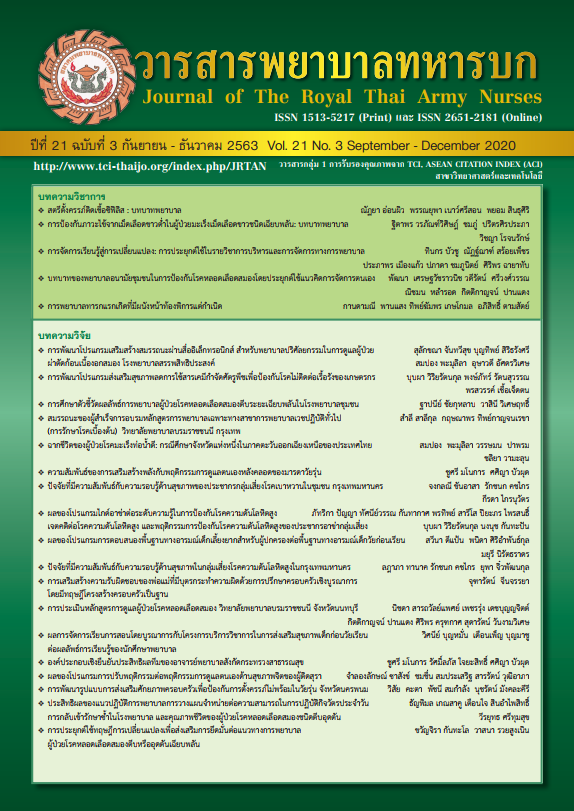The Effects of a Family Management-Enhancing Program on The Caregivers’skill of An Early Mobility of Stroke Patients
Keywords:
Family management- enhancing program, Caregivers skill, Early mobility, Cerebrovascular disease patientsAbstract
This quasi-experimental and time series research aimed to study the effects of a family management enhancing program on the caregivers’ skills of an early mobility among stroke patients. Purposive selection and thirty-six caregivers were separated in an intervention and control group. The research instruments comprised of the early mobility family management Program, the Booklet and symbolic modeling VDO. Data collection used the Caregiver Characteristics Data, Early Mobility Caring Skill of ADL and RMI. The contents validity of the instruments were tested by five experts = 0.90-0.93 and Cronbach’s alpha reliability test revealed 0.88 to 0.93. Data were analyzed using descriptive statistics, the chi-squares test, the Friedman test, repeated measures ANOVA, and Bonferroni test
The results revealed: 1) The mean score for the early mobility caring skills of ADL and RMI in both groups during the 1, 4, and the 8 week were increase significantly (p<.001) 2) Compared between the intervention and control group, the results revealed that the mean score for the early mobility caring skill of ADL and RMI at the 1 week was not differently, but between the 4 and the 8 week were different significantly (p<.001). The family management model and indicate that it can be used to develop the mobility skills of caregiver and help with the early mobility
Downloads
References
World Health Organization. Trends in Maternal Mortality ; 2012
Central and Disease Control. CDC Health Information for International Travel. Oxford University Press; 2016
World Stroke Organization. Annual report. World Stroke Organization.Retrieved ; 2016
Ministry of Public Health Office of Policy and Strategy. New incidence stroke; 2018
Neurology. Nursing care for patients with strokes; 2009
Kwok T, Lo, R. S, Wong E, Wai-Kwong T, Mok V, & Kai-Sing W. Quality of life of stroke survivors: a 1-year follow-up study. Archives of Physical Medcine and Rehabilitation 2006 ; 87(9), 1177-1182.
Saposnik G, Mamdani M, Bayley M, Thorpe K. E, Hall J, Cohen L. G, & Teasell R. Effectiveness of Virtual Reality Exercises in Stroke Rehabilitation (EVREST): ationale, design, and protocol of a pilot randomized clinical trial assessing the Wigaming system. International Journal of Stroke 2010; 5(1), 47-51.
Tieges Z, Mead G, Allerhand M, Duncan F, Wijck F, Fitzsimons C., & Chastin S. Sedentary behavior in the first year after stroke: alongitudenal cohort study with objective measures. Archives of Physica Medicine and Rehabilitation 2015; 96(1),15-23.
Askim T, Bernhardt J, Salvesen, & Indredavik B. Physical activity early after stroke and its association to functional outcome 3 months later. Journal of Stroke and Cerebrovascular Diseases 2014; 23(5), e305-e312.
Chainarong I, Pinyopasakul W, Kusuma S Na-Ayuthya,Koositamongkol S. The relationships among attitude toward exercise, subjective norms, perceived behavioral control and walking exercise intention in post stroke patients after hospital discharge. Journal of The Royal Thai Army Nurses, 2017;18(2): 178-85.(in Thai).
Ryan P, & Sawin K. J. The individual and family self-management theory: background and perspectives on context, process, and outcomes. Nursing Outlook 2009; 57(4), 217-225.
Mores G, Whiteman R, Knobl P, Ploeg J, Cahn M, Klaponski L, & Lindle A. Pilot evaluation of the family informal caregiver stroke self-management program. Canadian Journal of Neuroscience Nursing 2012; 35(2), 18-26.
Downloads
Published
How to Cite
Issue
Section
License
บทความหรือข้อคิดเห็นใดใดที่ปรากฏในวารสารพยาบาลทหารบกเป็นวรรณกรรมของผู้เขียน ซึ่งบรรณาธิการหรือสมาคมพยาบาลทหารบก ไม่จำเป็นต้องเห็นด้วย
บทความที่ได้รับการตีพิมพ์เป็นลิขสิทธิ์ของวารสารพยาบาลทหารบก
The ideas and opinions expressed in the Journal of The Royal Thai Army Nurses are those of the authors and not necessarily those
of the editor or Royal Thai Army Nurses Association.






